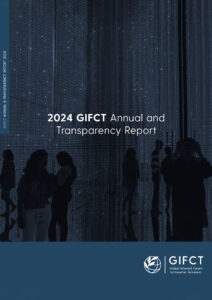Today, GIFCT publishes its 2024 Annual and Transparency Report. This marks our sixth year producing a report in line with the vision and commitment to transparency that we share with our tech company members.
In 2024, GIFCT delivered for its members and stakeholders through enhanced collaboration, improved resources, and strengthened connections between industry and global expertise, supporting collaborative efforts to address terrorism and violent extremism online.
GIFCT welcomed six new platforms – BIMeta, Bitly, Patreon, Streamable, Vimeo, and Yahoo – broadening the diversity of its membership and the tech stack GIFCT supports. This expansion to 33 members reflects GIFCT’s continued commitment to cross-platform collaboration as the online threat landscape grows more complex and globally dispersed.
In 2024, GIFCT developed frameworks to launch its in-house Membership Advisory Program (MAP) to support potential members and current candidates starting in 2025. GIFCT also updated the GIFCT Member Resource Guide, a key tool for platforms seeking to strengthen their policies and practices related to countering terrorism and violent extremism.
In 2024, we continued to review and update GIFCT’s organizational structures and roles. GIFCT rebranded its “Tech team” as the Trust and Safety Solutions team to better align with the needs of its member tech platforms. This shift reflects its commitment to better supporting trust and safety practitioners and clarifying its role as a collaborative partner in countering online threats. Core tools like the hash-sharing database (HSDB) and Incident Response Framework (IRF) remain central and are now positioned within a broader and evolving suite of practical trust and safety solutions.
In 2024, GIFCT activated the IRF seven times in response to terrorist and mass violence events with a significant online aspect, and increased the number of distinct items in the HSDB to 408,000 images, videos, and texts.
In 2024, GIFCT expanded its suite of knowledge products to better serve its key stakeholder communities, publishing more targeted analyses and recommendations addressing the specific needs of its members. Its academic research arm, the Global Network on Extremism and Technology (GNET), published 120 GNET reports, 62 of which highlighted attempts by terrorists or violent extremists to exploit GIFCT member platforms.
GIFCT also strengthened its global engagement in 2024. In Singapore, GIFCT co-hosted with Microsoft a Global Multi-Stakeholder Forum and reinforced its collaborative approach to identifying regional and cross-platform solutions. GIFCT’s first Latin American multi-stakeholder workshop, hosted in Rio de Janeiro in partnership with the Industry Federation of the State of Rio de Janeiro (Firjan), deepened its understanding of regional threats, trends, and opportunities on the continent. In Stockholm, GIFCT hosted a multi-stakeholder workshop at the Nordic Democracy Forum to assess cross-sector challenges and identify opportunities for stronger collaboration.
Alongside the opening of the United Nations General Assembly session in New York, GIFCT convened three side events with key partners to highlight the current state of play in online counter terrorism efforts and explore future opportunities for collaboration among stakeholders in industry, academia, and policy. This included events focused on emerging technologies, youth intervention, and sanctions within the tech sector.
2024 also saw the fourth annual GNET Conference and numerous GNET webinars, where experts from across sectors shared insights and learnings from the intersection of tech and counter terrorism. To cap off the year, GIFCT’s Annual Member Forum offered a dedicated space for its industry members to share insights, shape priorities for 2025, hear from its IAC, and ensure its future work remains responsive to member industry needs and emerging risks.
GIFCT’s Working Groups continued to deliver outputs aligned with its mission to prevent terrorist and violent extremist exploitation of digital platforms. In 2024, Working Groups produced guidance to evolve the HSDB, reviewed the IRF and shared suggestions that are helping to inform improvements being made to the framework in 2025, and created a community of practice and a set of resources for gaming platforms, including a literature review on gaming and extremism and best practices for safety-by-design.
GIFCT also made continued progress on the recommendations of its Human Rights Impact Assessment, including broadening collaboration with a wider range of multilateral entities, by hosting a human rights workshop for member companies, and developing the MAP framework to include more human rights support for members and candidates.
Reflecting global experiences, no single state or sector can alone address all the different dimensions of countering terrorism and violent extremism; similarly, no single platform can alone address all the challenges. Comprehensive and cross-platform solutions are key. As such, GIFCT is proud to work with industry, government, and civil society partners to ensure diverse worldwide experiences and good practices inform its work. GIFCT reaffirms its goal to work collaboratively, transparently, and in a manner that fosters respect for human rights to prevent terrorists and violent extremists from exploiting digital platforms.
2024 Annual & Transparency Report





